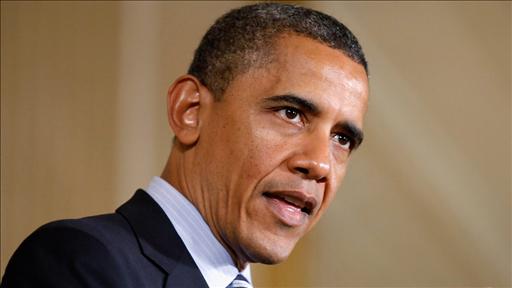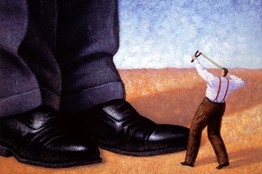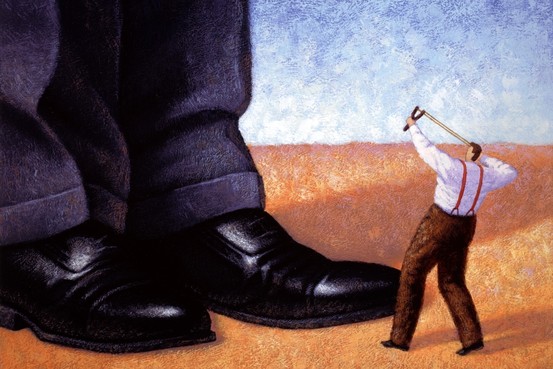Leaked national security secrets may be a dime a dozen now, but the Supreme Court still sits as the last major American institution that doesn't conduct its business out the back door. Which is to say none of the Supreme Court's nine justices called me to reveal their ObamaCare decision before its Thursday annunciation. What difference does that make? Anyone who had to wait for the Supreme Court to tell them what the Affordable Care Act represents is too far behind the curve to ever catch up. Alas, that includes Barack Obama, the president that time forgot.
Related Videos
Whether ObamaCare was affirmed or overturned by the ladies and men in robes, nothing was going to change one unimpeachable fact: From day one, the Obama health-care legislation was swimming against the tides of history. It was a legislative monolith out of sync with an iPad world. In the era of the smartphone, ObamaCare was rotary-dial health reform.
The signs this was so were everywhere, but Barack Obama and the Pelosi-Reid edition of the Democratic Party blew past them. Years before it arrived at the Supreme Court's door, the Obama health-care law was unpopular with the American public. With occasional exceptions, its unfavorables have been above 50% for nearly three years. And why not? It runs counter to the daily experience of virtually everyone.
Electronics, foods, fashion, entertainment, apps, social media, appliances—pretty much anything that escapes the cold hands of a public agency is laid before us in a dazzling, unprecedented array of choices. Despite all the incoming, people learned to navigate the options. Virtually everyone has become adept at customizing a personal milieu that suits them. Given a reasonably growing economy, they'll be able to sustain these choices.
In this context, the Affordable Care Act gave new meaning to the word "outlier." Starting with the insurance mandate. Of course most people hated it. They're living in a world turning more anti-mandate by the minute, and the Democrats are ordering them all into a national health-insurance pool.
Back in 2010, some Democrats talked like it was 1937 all over again. They intoned how for 70 years they've wanted to enact a big national health-care law. The Depression—those were the glory days. Or they said ObamaCare's coverage-for-all would close the policy loop left open 45 years ago with Medicare for the elderly and Medicaid for the poor. So naturally one pillar of the Obama health-care law was to push more people into Medicaid's already faceless, frightening maw.
This is a Democratic Party whose political survival now is yoked to monolithic public-employee unions that themselves haven't allowed a new idea in 40 years. The teachers unions persist in an irrational, immoral refusal to try other ways of teaching inner-city kids.
Public-employee unions in California are letting towns and cities—the latest is Stockton—slide over the fiscal cliff. Since JFK, the Democrats have departed once from a political one-size-must-fit-all, and that was the Clinton welfare reform, which freed impoverished women to enter the private economy inhabited by everyone else. That was it. The Republicans, to their discredit, don't have an alternative to ObamaCare, but at least they're not still building more Titanics.
The Affordable Care Act is the exhibit du jour, but there is a disconnect nearly everywhere between governments and the reality of the way life is lived by the people they govern. Across Europe, the young are being drowned by something known as "the welfare state." It sounds more Orwellian than it did the first time. Other than the crude imperatives of survival amid a modernizing people, the Chinese Communist Party is clueless.
It remains astonishing that even now, the one American politician who instinctively grasped that the standard model of 20th-century government needed to adjust was Ronald Reagan. Barack Obama deployed the new world of social media in 2008 to become president, and then violated every new thing social media represents with a health-care law whose central processing unit is the antiquarian Department of Health and Human Services. He similarly nationalized student loans, forcing college students to deal with the punch-card mainframes or whatever they use at the U.S. Department of Education.
The public sector of its nature will always be behind the curve. But does it have to be routinely out of it, as Washington is now? The American people await a national politician or political party whose public policies at least occupy the same universe that the electronic tablet represents—real value that can be altered and upgraded to admit new realities.
Over time, a health-care dinosaur like ObamaCare was likely to implode under its own weight. It was inevitable that some future Congress would be forced to allow the delivery of medicine to join the rest of us in the 21st century. With or without the Supreme Court's thoughts Thursday on the constitutionality of the Affordable Care Act, that day lies in the future.
Write to henninger@wsj.com
A version of this article appeared June 28, 2012, on page A15 in the U.S. edition of The Wall Street Journal, with the headline: The President That Time Forgot.









![[image]](https://iza-server.uibk.ac.at/pywb/dilimag/20210113092156im_/http://si.wsj.net/public/resources/images/MK-BV389_HOUGHT_C_20120701170025.jpg)
![[image]](https://iza-server.uibk.ac.at/pywb/dilimag/20210113092156im_/http://si.wsj.net/public/resources/images/MI-BP829_curry_C_20120701170605.jpg)
![[image]](https://iza-server.uibk.ac.at/pywb/dilimag/20210113092156im_/http://si.wsj.net/public/resources/images/NY-BT061_SWIM_C_20120701193212.jpg)
![[image]](https://iza-server.uibk.ac.at/pywb/dilimag/20210113092156im_/http://si.wsj.net/public/resources/images/P1-BG850_SCYTHE_C_20120629173254.jpg)
![[image]](https://iza-server.uibk.ac.at/pywb/dilimag/20210113092156im_/http://si.wsj.net/public/resources/images/OB-TO602_boxila_C_20120628203443.jpg)






Most Recommended
“Try and fathom the hypocrisy of ...;”
“Perhaps, Mr Gensert, it's not th...;”
“Another thoughtful and concise...;”
“However, Ms Napolitano immediate...;”
“My thought, exactly...You go on...;”